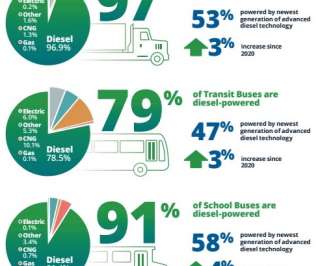DTF: Diesel dominates commercial truck, transit and school bus fleets in US
Green Car Congress
JULY 14, 2022
Diesel is the predominant technology in commercial trucking, school, and transit bus sectors, according to the Diesel Technology Forum’s analysis of data sourced from S&P Global Mobility TIPNet data of vehicles in operation for Class 3-8 as of December 2021. Electric and other categories each register less than 1%.






































Let's personalize your content